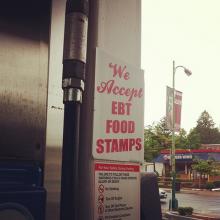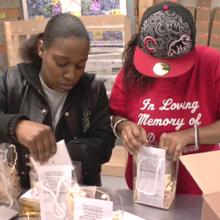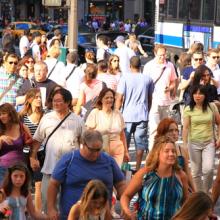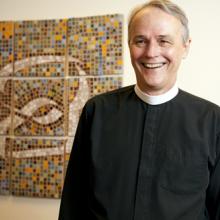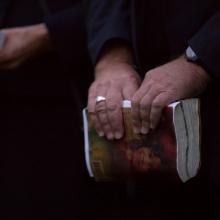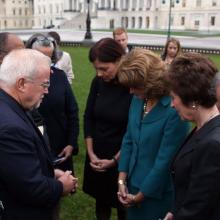Economic Justice
I love Dave Ramsey’s Financial Peace coursework. It put our family on stable financial footing years ago, and Amy and I never fight about financial matters any more. We find plenty of other things to fight about, but that’s a different post, I suppose.
Ramsey has come under fire recently for a list of “Rich People Habits” he posted on his blog. The list was compiled by Tom Corley at a site called RichHabitsInstitute.com, which is intended to track what people of means do differently in daily life than the rest of us (aside from brush their teeth with platinum-bristled brushes, since that one’s a given).
On the one hand, I’ll agree that observing a cohort of people you want to emulate and learning from their habits makes a lot of sense, but I can see why Ramsey and Corley have caught so much heat for comparing habits of “poor people” with those of the wealthy.
There are two problems that I see. First, though Ramsey tends to be an advocate for the poor with regard to pushing back against usury lending and the like, he draws many false correlations between the habits listed below and the fact that folks who practice them are in poverty. In fact, in a recent defense of the post, Ramsey reiterated this point, writing, “This list simply says your choices cause results. You reap what you sow.”
The other concern the list raises for me is that it appears to be blind to the inherent privilege linked to the habits, as if all people had equal access to such practices and resources. Not so, Dave. Below I’ve shared several of the 20 habits on the original list (which can be found here), followed by my thoughts on where they fall short.
“She wakes to the sound of breathing. The smaller children lie tangled beside her, their chests rising and falling under winter coats and wool blankets.”
So begins the New York Times story following Dasani, an 11-year-old girl living homeless in New York. Dasani lives with her parents and seven siblings in a family residence shelter. From school to dance class to home, Dasani feels the weight of poverty and an unstable family.
According to the story, one in five children in America live in poverty, “giving the United States the highest child poverty rate of any developed nation except for Romania.”
In this five-part multimedia story, life told through Dasani’s eyes offers an honest look at homelessness and the pursuit for a hopeful future.
Read the full story here.
IN THE LAST YEAR of his life, Martin Luther King Jr. struggled with what are best understood as existential challenges as he began to move toward an ever-more-profound and radical understanding of what would be required to deal with the nation’s domestic and international problems.
The direction he was exploring, I believe, is far more relevant to the realities we now face than many have realized—or have wanted to realize.
I first met King in 1964 at the Democratic Party’s national convention held that year in Atlantic City—the occasion of an historic challenge by the Mississippi Freedom Democratic Party (MFDP) to the racially segregated and reactionary Mississippi Democratic Party. I was then a very young aide working for Sen. Gaylord Nelson of Wisconsin. Sen. Nelson authorized me to help out in any way I could despite President Lyndon Johnson’s effort to clamp down on the fight for representation in the interest of a “dignified” convention that would nominate him in his own right after his rise to the presidency following President Kennedy’s assassination. Johnson didn’t want a bunch of civil rights activists muddying the waters and, not incidentally, causing him problems in the conservative, race-based Democratic South.
After much back and forth, the Johnson administration offered a “compromise” proposal that the old guard be seated (provided they pledged to support him) and that two at-large representatives of the MFDP also be seated.
Fear, anxiety, and secrecy marked the roughly year and a half I received federal food stamps.
Like the New Testament’s famed Samaritan woman who snuck to the well at an odd hour to get water, I tried to retrieve the sustenance my family needed outside the view of my immediate community.
I tried never to let those around me see me using the food stamp card, and certainly wouldn’t have ever told my extended family or friends. I wanted no one to know I was living outside the bounds of “acceptable” life.
I had decided to find out whether I qualified for the Supplemental Nutrition Assistance Program (SNAP) while a full-time seminary student trying to raise three teens — one of them in college. I worked jobs as much as I could around my school schedule, but in the end I never had enough money to pay bills, meet my children’s needs, and buy enough groceries for the month.
This is Giving Tuesday, when nonprofits of every stripe hope to attract some of the billions of dollars to be spent during the Hanukkah and Christmas season.
Many of those dollars will go to religious groups. Now, new research is expanding the meaning of “religious giving.” It counts motivation for giving, and measures not only gifts to houses of worship but also donations to faith-connected nonprofits that are doing secular service such as fighting poverty or offering job training for the disabled.
“Most people cite their religious commitments, but most also cite the belief that they should give to benefit others. Many people hold both these impulses at the same time,” said Shawn Landres, a co-author of the research report, “Connected to Give: Faith Communities.”
Laying out a blueprint for the issues that are likely to define his papacy, Pope Francis on Tuesday issued a biting critique of capitalism, calling on world leaders to fight against poverty and for the rich to share their wealth, and urging the media to adjust its priorities.
“How can it be that it is not a news item when an elderly homeless person dies of exposure, but it is news when the stock market loses two points?” Francis asked in an 84-page “apostolic exhortation” that is widely seen as a road map for his papacy akin to a presidential State of the Union address.
“How can we continue to stand by when food is thrown away while people are starving?” he asked. “Today, everything comes under the laws of competition and the survival of the fittest, where the powerful feed upon the powerless. As a consequence, masses of people find themselves excluded and marginalized: without possibilities, without any means of escape.”
In the age of the internet, we have access to a vast quantity of information beyond our dreams even twenty years ago. Most of the time, I use this power to look at LOLCats and Buzzfeed articles like "11 Signs You Might be Dating a Pirate."
But as a Christian who feels the weight of caring for the people Jesus called "the least of these," I feel a responsibility to be educated about the plight of the billions of people who live on less than $2 per day around the world (and here in the US, as recently evidenced by the cuts to food stamp programs).
Caring for the poor directly in our neighborhoods is essential to the mission of the local church, and universally, it is the Church’s responsibility to care for the poor in every corner of the planet.
Among the largest phenomena that have arisen from foreign debt crises and loan repayment structures are predatory hedge funds, known as vulture funds. Simply said, vulture funds intentionally target the debt of financially distressed nations. They monitor the likelihood of a country’s ability to gain international debt relief. Right before the country receives aid, vulture funds buy up the nation’s debt. Then, they call in their debt bonds, suing the country once it receives resources that help debt cancellation. The result is that vulture funds, after buying distressed debt for pennies on the dollar, turn around and sue to recover up to ten times the purchase price.
Because vulture funds locate themselves in such offshore tax havens as the Cayman Islands, the companies or individuals remain a secret. Many times, there is no source of reliable information on who actually owns them, making accountability impossible.
As the U.S. Catholic bishops began their annual fall meeting on Monday, they were directly challenged by Pope Francis’ personal representative to be pastors and not ideologues — the first step of what could be a laborious process of reshaping the hierarchy to meet the pope’s dramatic shift in priorities.
“The Holy Father wants bishops in tune with their people,” Archbishop Carlo Maria Vigano, the Vatican ambassador to the U.S., told the more than 250 American churchmen as he recounted a personal meeting in June with Francis.
The pontiff, he added, “made a special point of saying that he wants ‘pastoral’ bishops, not bishops who profess or follow a particular ideology,” Vigano said. That message was seen as an implicit rebuke to the conservative-tinged activism of the bishops’ conference in recent years.
Almost since his election in March, Francis has signaled that he wants the church to strike a “new balance” by focusing on the poor and on social justice concerns and not overemphasizing opposition to hot-button topics like abortion and contraception and gay marriage — the signature issues of the U.S. bishops lately.
There is a popular African proverb that says, when elephants fight, it is the grass that suffers. This proverb highlights the reality that too often while nations and powerful entities fight amongst themselves, the common people of the land suffer the most. It is a historical truth that those who make the decision to wage wars (military, legislative, or otherwise) often have the least to lose. Sure, they may lose their prestige, position, or power, but in the end their essential well-being and access to basic necessities are maintained. Sadly, the same cannot be said of many of those who are the instruments and casualties of war and political conflict.
Veterans: America’s Suffering Grass
In the United States, a large number of veterans who fought in wars at the command of the political elite have returned home from the battlefield to a life of impoverishment and fickle social services.
Gov. John R. Kasich (R-Ohio) did a shocking thing recently. He broke with his political allies and decided to expand Medicaid to 275,000 poor people in his state through the Affordable Care Act. Then he called a spade a spade, saying: “I’m concerned about the fact there seems to be a war on the poor.”
Kasich’s statement came just two days ago. And today, 47 million low-income Americans will see their food stamps benefits decrease as stimulus funding ends. In light of this newly named “war on the poor,” I’ve been reflecting on Jesus’ story of the Good Samaritan, and the man’s question to Jesus, “Who is my neighbor?” What an intriguing question.
Of course one of the most incredible things about this story is that Jesus never answers the lawyer’s question. Rather, he tells a story about a man beaten by robbers on a dangerous road. He was stripped naked left lying there, clinging to life. Both a priest and Levite pass him by, but a Samaritan went out of his way, broke his usual routine, used up his own gas (or at least his donkey’s energy) to bring the man to an inn. And he took care of him overnight at the inn, offering the innkeeper what would today be about $330.
And then Jesus flips the script! The lawyer asked who exactly is my neighbor? Who do I have to love? And conversely who can I cross off my need-to-love list?
Jesus doesn’t answer the question. Jesus returns his question with a question: “Who was a neighbor to the man who fell into the hands of robbers?”
Nowadays we hardly have a concept of what it means to be a neighbor anymore.
“Whoever has two coats must share with anyone who has none; and whoever has food must do likewise.” (Luke 3:11)
Many of us are blessed enough to not know what it is like to be hungry, to regularly miss meals, or to consume a diet void of essential nutrients for a healthy life. But now, millions of our brothers and sisters here in the United States may, sadly, be facing these situations because of a reduction in their food stamp benefits.
Starting Friday, all households receiving food stamp benefits will see their food budgets shrink as a temporary increase expires. A family of four could lose up to $36 a month in food stamps (also known as the Supplemental Nutrition Assistance Program, or SNAP).
American Promise spans 13 years as Joe Brewster and Michèle Stephenson, middle-class African-American parents in Brooklyn, N.Y., turn their cameras on their son, Idris, and his best friend, Seun, who make their way through one of the most prestigious private schools in the country. Chronicling the boys’ divergent paths from kindergarten through high school graduation at Manhattan’s Dalton School, the documentary presents complicated truths about America’s struggle to come of age on issues of race, class, and opportunity. American Promise is an Official Selection of the 2013 Sundance Film Festival.
The Criminal Justice Degree Hub released an infographic on mass incarceration in the U.S. titled "Locked Up In America." According to the extensive graphic, the U.S. has 5 percent of the world's population and 25 percent of the world's prisoners.
Check out the graphic here.
For most of human history, religious faith has been central to the life, economy, and government of virtually all societies. Babylon, Egypt, China, Greece, and Rome: all of these empires explicitly traced their authority from heaven, the gods, or other transcendent concepts that can only be described as religious. Religious acts were political acts, and vice versa. To challenge the status quo of the ruling authorities was to call into question the religious authorities, as well. Expressions of faith were serious business.
For more than a thousand years, Western Christianity was the theological glue that held European society together. We can still observe remnants of these former times in the civil religion of the United States. Even today, presidents invoke the name of God during speeches. Prayers are spoken before sessions of legislative bodies. New citizens and government employees are required to swear oaths of loyalty to the state. Our civil structures still bear traces of a time when Christian religious concepts were deeply intertwined with government.
For the most part, however, theistic religion is being pushed steadily out of our civic life.
The theatrics around the Affordable Care Act seem only to be matched by the public’s ignorance about what it actually is. Case in point: when late-night talk show host Jimmy Kimmel sent a reporter out on the street to ask people their opinions, they felt markedly better about the nuts and bolts of the Affordable Care Act than they did about Obamacare.
Never mind they’re the same thing (sigh).
It seems that a handful of lawmakers have seen to it that our ignorance is sown into full-blown fear, obfuscating the fact that the shutdown – which was largely a fight over the ACA – cost our economy about $25 billion. For those who have been following even on a cursory level, the arguments against the ACA are becoming quite familiar:
· The individual mandate infringes on my freedom not to have insurance.
- The whole thing costs too much.
- It’s a slippery slope to a single-payer system.
On this last point, we can only hope the critics are right, particularly since a single-payer health care system is the only model that has offered hard evidence of both covering everyone and reducing total costs. But since we’re not there yet, let’s consider what we do have with this new law.
My child ate today. Breakfast was pancakes and sausage.
Walking to school I said, “If you don’t like the leftover hamburger that I put in your lunchbox, just buy something from the cafeteria. You have plenty of money in your account.”
Tonight we will have tacos, but if I am too tired to cook, we will order pizza.
I am grateful that I can feed my child every day.
Watching the dysfunction in Washington over the past two weeks has been painful. Our leaders have grown too comfortable with pushing the limits, and we let a few dozen of our own representatives — the people elected to promote the common good, or “general welfare,” as the Constitution calls for— hold the nation's economy hostage for the sake of their political self-interest.
But after the storm comes the promise — the hope of lessons learned and new ways forward together. A few key groups of people have renewed my faith that this is possible.
When I began to read, I started by going through the Psalms. An elderly gentleman paused to listen, and then requested if I could read aloud his favorite, Psalm 91. As I read it, he also began to softly quote the verses by heart, praising God and saying “hallelujah” before thanking me and walking on.
Later, a local pastor from the District Church in Colombia Heights came to read. We met a couple visiting from Louisiana. The wife was a furloughed federal employee with Immigration and Customs Enforcement. It was interesting to hear her point of view working first-hand with immigrants in a deportation capacity. She said as a Christian, it is sometimes very difficult to find a balance between desiring to deport violent criminals, and also wanting to keep hardworking, law-abiding immigrant families together. She and her husband thanked all who were participating in the Faithful Filibuster for keeping Christ present during the government shutdown.
As the next speaker from Salvation Army was reading, several teens participating in a rally at the Supreme Court came to ask about what we were doing. After explaining the filibuster’s mission, a young boy thanked us, shook hands, and said “God bless you.”
During a sunrise vigil at the U.S. Capitol this morning, three senators unexpectedly joined us. They were all women, all Republican and, it turns out, all Catholic. Sens. Susan Collins of Maine, Lisa Murkowski of Alaska, and Kelly Ayotte of New Hampshire are part of a new 14-senator bipartisan, women-led group engaged in their own kind of vigil: trying to end the government shutdown and prevent the nation from going into debt default.
A chuckling comment from a male colleague in the Senate perhaps expresses a hope in the midst of this incredibly dangerous political crisis: “The women are taking over.” This morning, the senators walked over to thank us for praying for them and the government at this critical moment and told us how much they felt the need for our prayers right now. The looks on their faces showed us the seriousness of their plea for prayers.
People of faith are instructed to pray for their political leaders, and their need has never been more evident in this completely dysfunctional Capitol City. For the seventh day now, faith leaders, pastors, young people, and passersby lifted up prayers for the common good across from the Capitol. Until this morning, there was no response from our elected officials or the national media pundits.
But the #FaithfulFilibuster has taken off across the country through word of mouth and social media — our prayers are trending.

